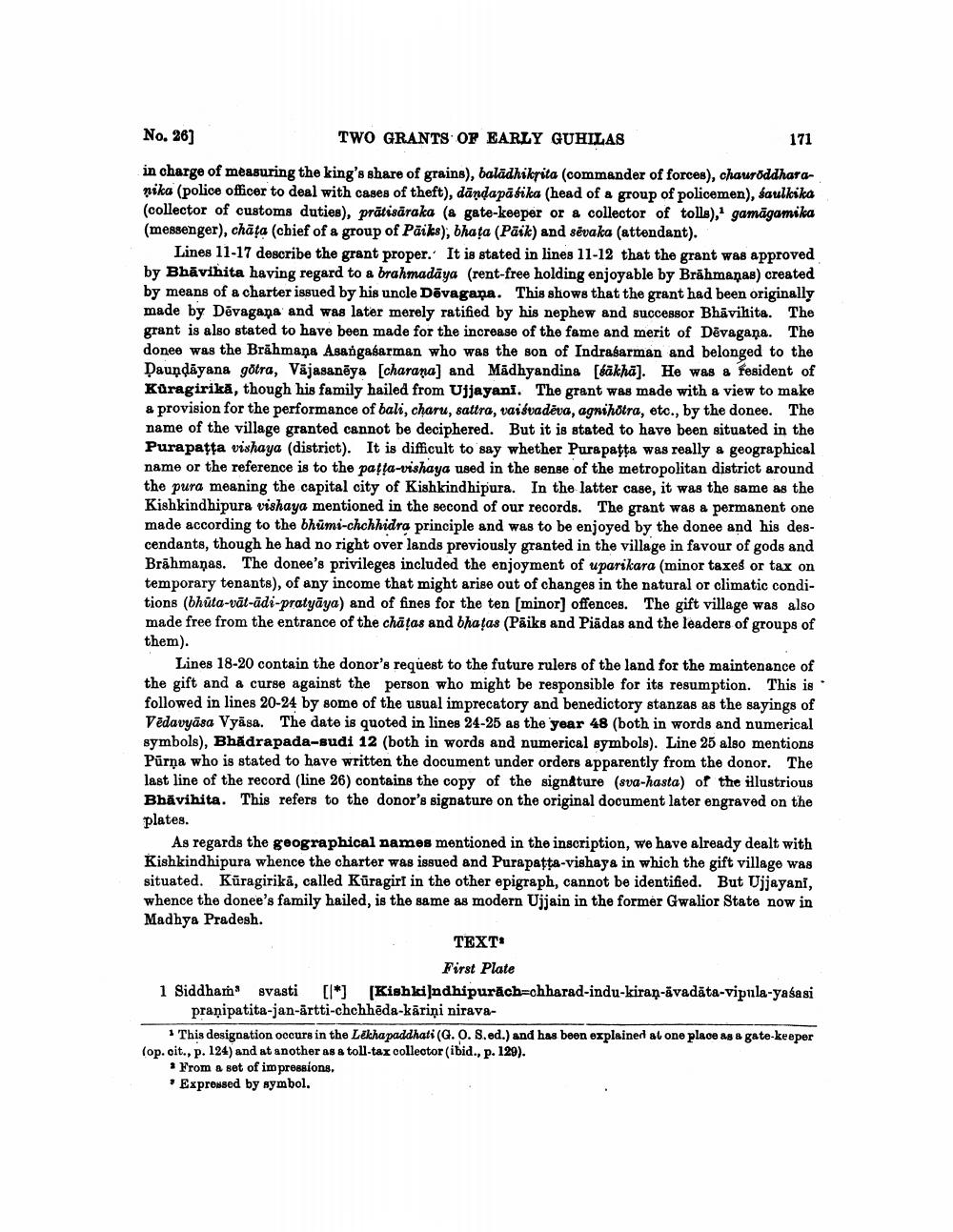________________
No. 26]
TWO GRANTS OP EARLY GUHILAS
171
in charge of measuring the king's share of grains), balādhikrita (commander of forces), chaurðddharanika (police officer to deal with cases of theft), dāndapā tika (head of a group of policemen), saulkika (collector of customs duties), prātisäraka (& gate-keeper or a collector of tolls), gamāgamika (messenger), chāta (chief of a group of Päiks), bhata (Päik) and sëvaka (attendant).
Lines 11-17 describe the grant proper. It is stated in lines 11-12 that the grant was approved by Bhāvihita having regard to a brahmadāya (rent-free holding enjoyable by Brahmanas) created by means of a charter issued by his uncle Dāvagana. This shows that the grant had been originally made by Dévagana and was later merely ratified by his nephew and successor Bhävihita. The grant is also stated to have been made for the increase of the fame and merit of Dēvagana. The donee was the Brāhmaṇa Asangaśarman who was the son of Indragarman and belonged to the Daundāyana götra, Vajasanēya [charana) and Mädhyandina [sakha). He was & Fesident of Kuragirikā, though his family hailed from Ujjayani. The grant was made with a view to make a provision for the performance of bali, charu, sattra, vaisvadeva, agnihotra, etc., by the donee. The name of the village granted cannot be deciphered. But it is stated to have been situated in the Purapatta vishaya (district). It is difficult to say whether Purapatta was really a geographical name or the reference is to the patta-vishaya used in the sense of the metropolitan district around the pura meaning the capital city of Kishkindhipura. In the latter case, it was the same as the Kishkindhipura vishaya mentioned in the second of our records. The grant was a permanent one made according to the bhumi-chchhidra principle and was to be enjoyed by the donee and his descendants, though he had no right over lands previously granted in the village in favour of gods and Brāhmaṇas. The donee's privileges included the enjoyment of uparikara (minor taxes or tax on temporary tenants), of any income that might arise out of changes in the natural or climatic conditions (bhuta-vat-ädi-pratyāya) and of fines for the ten (minor) offences. The gift village was also made free from the entrance of the chätas and bhatas (Päiks and Piadas and the leaders of groups of them).
Lines 18-20 contain the donor's request to the future rulers of the land for the maintenance of the gift and a curse against the person who might be responsible for its resumption. This is followed in lines 20-24 by some of the usual imprecatory and benedictory stanzas as the sayings of Vedavyäsa Vyasa. The date is quoted in lines 24-25 as the year 48 (both in words and numerical symbols), Bhadrapada-sudi 12 (both in words and numerical symbols). Line 25 also mentions Pürna who is stated to have written the document under orders apparently from the donor. The last line of the record (line 26) contains the copy of the signature (sva-hasta) of the illustrious Bhāvihita. This refers to the donor's signature on the original document later engraved on the plates.
As regards the geographical names mentioned in the inscription, we have already dealt with Kishkindhipura whence the charter was issued and Purapatta-vishaya in which the gift village was situated. Küragirikå, called Küragirl in the other epigraph, cannot be identified. But Ujjayani, whence the donee's family hailed, is the same as modern Ujjain in the former Gwalior State now in Madhya Pradesh.
TEXT
First Plate 1 Siddhar gvasti
Kishkindhipurăch=chharad-indu-kiran-ävadāta-vipula-yasasi pranipatita-jan-artti-chchhēda-kāriņi nirava* This designation occurs in the Lekhapaddhati (G. O.S.ed.) and has been explained at one place as a gate-keeper (op. oit., p. 124) and at another as a toll-tax collector (ibid., p. 129).
• From a set of impressions. Expressed by symbol.




